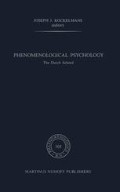Abstract
However diverse the notions may be which we form of “happiness-as-such”, in one respect we agree essentially: we know that we do not possess it from the beginning. One “makes,” “seeks,” “builds” his happiness. In all these expressions we find the notion that happiness must be the result of an act, an activity, a phase of life, the result of living. The experience of happiness thus has nothing immediately to do with the inchoative upsurge and being-underway in a certain direction. It is rather a kind of experience of termination. It is connected with the terminating phase of experience in a manner to be still more carefully determined.
Access this chapter
Tax calculation will be finalised at checkout
Purchases are for personal use only
Preview
Unable to display preview. Download preview PDF.
Reference
Cf. Stephan Strasser, Phenomenology of Feeling, trans. Robert E. Wood (Pittsburgh: Duquesne University Press, 1977), pp. 226ff.
For this analysis cf. L. Vander Kerken, Het menselijk geluk (Amsterdam: Noordnederland- sche Boekhandel, 1952).
Cf. his “Vierfelder-Schema,” in Allgemeine Psychologie auf personalistischer Grundlage (The Hague: Nijhoff, 1950), p. 736.
Cf. Stephan Strasser, op. cit., pp. 240ff.
Cf.ibid.,pp. 215ff.
L. Vander Kerken, Het menselijk geluk, pp. 126–127. Philipp Lersch expresses himself similarly: according to him, every enjoyment “contains” pleasure (Aufbau der Person (Munich: J.A. Barth, 1952), p. 185). On the problem of ambivalent experience, cf. among others: E. Bleuler (Dementia Praecox oder Gruppe der Schizophrenien (Leipzig: Deuticke, 1911), pp. 305ff. and 395ff.) and
Karl Jaspers (General Psychopathology (Chicago: University of Chicago Press, 1963), p. 342). On the problem of ambivalent experience of Transcendence, cf. Rudolf Otto, The Idea of the Holy: An Inquiry into the Non-Rational Factor in the Idea of the Divine and Its Relation to the Rational, trans. W. Harvey (Cambridge: Oxford University Press, 1950).
In this sense, one could relate Victor Cathrein’s descriptions of hedone to enjoyment, but not to that which the psychologist is wont to term “pleasure.” Cf. “Lust und Freude, ihr Wesen und ihr sittlicher Charakter mit besonderer Berücksichtigung der Lehre des Aristoteles,” in Philosophie und ihre Grenzwissenschaften, vol. III (Innsbruck: Rauch, 1931), Heft 6, pp. 12ff.
Felix Timmermans, Adriaan Brouwer (Amsterdam: P.N. van Kampen, 1947), p. 27. In the translation we had to give up rendering the shadings of dialect in the original text.
Stephan Strasser, op. cit., pp. 167ff.
“Beiträge zur Phänomenologie des ästhetischen Genusses,” in Jahrbuch für Philosophie und phänomenologische Forschung, vol. I, Halle, 1913, p. 605.
“… for actuality (energeia) exists not only in motion (kineseos) but also in something motionless (akinesias), and pleasure (hedone) depends more on rest (eremiai) than on motion.” Nicomachean Ethics, VII, 15 1154b26–28, (In the original the Greek text was quoted in this note; I have translated this passage “literally” and indicated the Greek words which arc important in this context in transliterated form. Ed.).
Stephan Strasser, op. cit., p. 212.
Georges Dumas, “La douleur et le plaisir,” in Nouveau Traité de Psychologie, 9 vols., (Paris: Alean, 1932ff.), vol. II, p. 290.
Johann Wolfgang Goethe, “An den Mond,” in Sämtliche Werke, ed. Karle Goedeke, 15 vols. (Stuttgart: Cotta, 1871–1872), vol. I, p. 72.
Cf. Helmuth Plessner, Lachen und Weinen(Bern: Francke Verlag, 1961), pp. 179ff.
Isaiah, 35, 1–4.
Joseph von Eichendorff, “Wandernder Dichter,” in Werke, 4 vols., ed. Ludwig Krähe (Berlin: Bong, n.d.), vol. I, p. 40. However, note that pasture (die Aue) is the subject of the last lines. (Ed.)
“To travel means to set out for discovery, for inquiry into the unknown for the experience of what is suspected,” notes Vander Kerken in Het menselijk geluk, p. 195.
Philipp Lersch, Aufbau der Person, p. 252.
Psalm 23, 1–4.
Stephan Strasser, op. cit., pp. 335ff.
Aquinas, Summa Theologiae, vol. I, q. 10, art. 1.
Stephan Strasser, op. cit., pp. 342–343.
Ibid., pp. 149ff. and 243ff.
Editor information
Editors and Affiliations
Rights and permissions
Copyright information
© 1987 Martinus Nijhoff Publishers, Dordrecht
About this chapter
Cite this chapter
Strasser, S. (1987). Eidetic of the Experience of Termination. In: Kockelmans, J.J. (eds) Phenomenological Psychology. Phaenomenologica, vol 103. Springer, Dordrecht. https://doi.org/10.1007/978-94-009-3589-1_7
Download citation
DOI: https://doi.org/10.1007/978-94-009-3589-1_7
Publisher Name: Springer, Dordrecht
Print ISBN: 978-94-010-8105-4
Online ISBN: 978-94-009-3589-1
eBook Packages: Springer Book Archive

